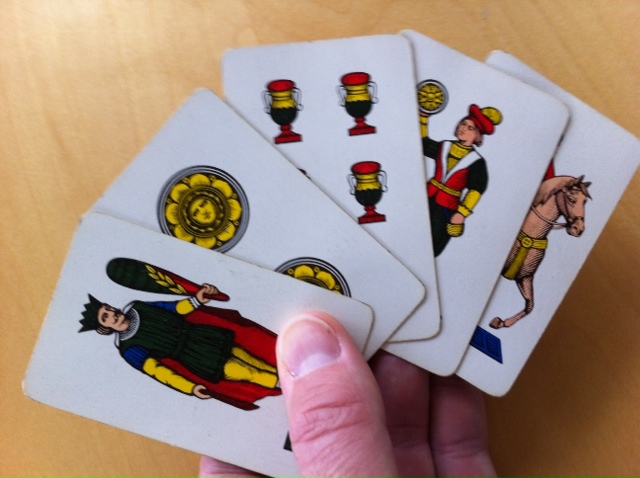Welcome to my guide on mastering Scopa, the classic Italian card game. Learn how to dominate by capturing valuable cards, executing perfect Scopas, and optimizing your Primiera score. The article breaks down essential strategies, from smart card play to advanced tactics like fishing and strategic discarding. Whether you’re playing one-on-one or in a team, these tips will sharpen your game.
Scoring Strategies

In Scopa, maximizing your point gain each round is crucial. I focus on achieving Scopas, prioritizing my captures, and calculating the Primiera, all of which are essential for a strong scoring strategy.
Achieving Scopas
Scopas are a key to scoring in this game. I always aim to clear the table with a capture, as this nets me an additional point for each Scopa. To do this effectively, I pay close attention to the cards in hand and the table, calculating potential combinations that could leave the table empty after my turn.
Priority of Captures
Capturing valuable cards is essential. I focus on securing cards that are part of the Primiera set or have point values, like the settebello (the seven of coins). For example, capturing a large number of coins can be a game-changer because of their scoring potential. The settebello, which is the seven of coins, is particularly worth targeting as it is worth one point on its own.
- Coins: Aim to capture as many coins as possible, especially higher-value ones.
- Cards: Capturing the most cards can lead to additional points.
- Settebello: Securing the seven of coins is also a strategic move.
Calculating Primiera
Calculating my Primiera score involves careful consideration. I track my highest cards in each suit—coins, cups, swords, and clubs—and compare values using the Scopa scoring system. For instance, Sevens are top-ranking, followed by Sixes, Aces, Fives—it’s like playing tressette with just a subset of cards.
- Primiera Scoring:
- Sevens: Highest value for Primiera.
- Sixes: Next in line and vital for counteracting opponent’s Sevens.
- Aces: Important, but not as much as Sevens or Sixes.
Advanced Techniques

OK now that we’ve learned the basics, let’s move onto the advanced tactics and explore a few strategies that can help you become a more formidable Scopa player.
Fishing for Cards
When I’m fishing for cards, I keep a keen eye on the table and aim to capture multiple cards in a single turn. This is often possible when I notice a combination of cards that add up to the value of a card I have in my hand. For instance, if there are a 2 and a 4 on the table, and I have a 6, I’ll play it to capture both, thus clearing the table and potentially setting myself up for a Scopa on the next turn.
Strategic Discarding
Discarding plays a pivotal role in my Scopa strategy. My goal is to discard in such a way that it minimizes the possibility of my opponents capturing many cards. I tend to discard higher-value cards when it seems less likely that they can be captured, or when I wish to bait my opponents into leaving a setup that I can capitalize on during my next turn.
Memorizing Cards
One of the most crucial skills I’ve developed is memorizing which cards have been played. This allows me to make informed decisions about which cards to play and when to play them. By keeping track of this, I also get a better sense of what cards are likely still in my opponents’ hands, which in turn informs my fishing and discarding strategies. An effective Scopa player, like in Cassino, must remember the key cards that influence scoring, such as the 7 of coins, which is part of the “Primiera”.
Winning the Game
To emerge as the winner in Scopa, I center my play on scoring efficiently throughout the game. By the time we reach the end of the game, a clear strategy for accumulating points is key.
My primary goal is to capture as many cards as possible, focusing on valuable cards to increase my points. Sweeping the table clean in a move called a Scopa earns me an additional point, which can often be the decisive factor in tight games.
I keep track of the most cards captured because this gives me a point advantage. Here’s how the points usually break down at the end:
- Most cards: 1 point
- Most Coins: 1 point
- Settebello (the 7 of coins): 1 point
- Primiera: 1 point
In case of ties, which are not uncommon, we share the points. This can add a layer of complexity to my strategy because I need to be mindful not just of my own point tally, but also my opponents’.
I also focus on the concept of Scopas. Each Scopa I achieve gives me an additional point. These can add up and often clinch my victory. It is a moment of celebration and can be seen as a prize for my clever play.
Capturing cards that lead to scoring is essential, but I also need to anticipate my opponent’s moves and adapt my plans accordingly. It’s a balance between being aggressive to gain points and strategic to prevent my opponent from scoring.
Remember, the game doesn’t end until the last card is played, so every play can turn the tide. You’ve gotta stay vigilant and adaptable until the very end.
Frequently Asked Questions
In this section, I’ll answer some of the most common questions about strategizing in Scopa to help you win.
How does the number of players affect strategy in Scopa?
When the number of players varies, my Scopa strategy shifts significantly. Playing one-on-one requires a more aggressive approach, focusing on denying my opponent valuable cards. In contrast, multiplayer games involve predicting not just one, but several opponents’ moves, making it more about tactical card retention and partnerships.
What tactics should you use to capture the most valuable cards in Scopa?
To capture the most valuable cards, such as the Settebello (the seven of coins) or cards worth points, I always pay close attention to what has been played and try to bait my opponents into leaving valuable cards exposed. Timing sweeps, or ‘Scopas’, when I can clear the table, also maximizes my card captures.
How can you track your opponent’s cards during a Scopa game?
Tracking is key in Scopa. I try to remember which cards have been played and which ones are likely still in my opponent’s hands or are yet to be dealt. Keeping mental notes on high-value cards and suits majority helps me anticipate their moves and counteract strategically.
What are some tips for forming the best team strategy in a 4-player Scopa game?
In a 4-player team game, communication with my teammate is subtle yet crucial. We focus on setting each other up for capturing high-value cards and Scopas. Additionally, we decide strategically who should go first to control the flow of the game and pay attention to our opponents’ tendencies to exploit their strategy.